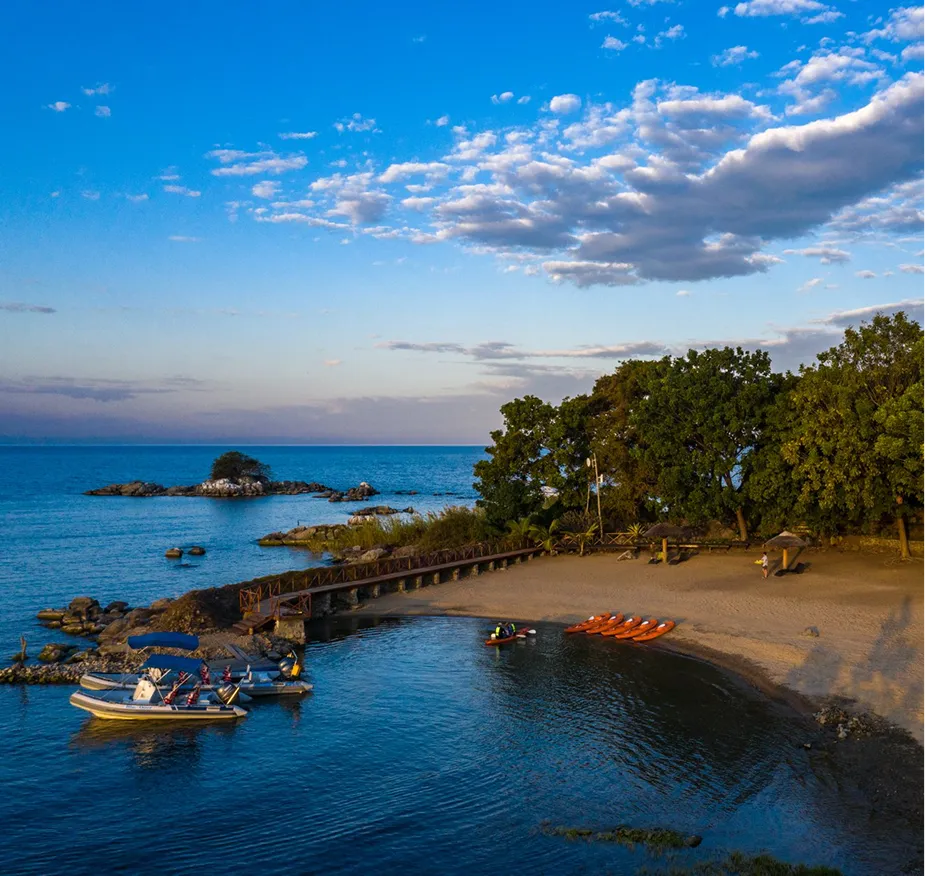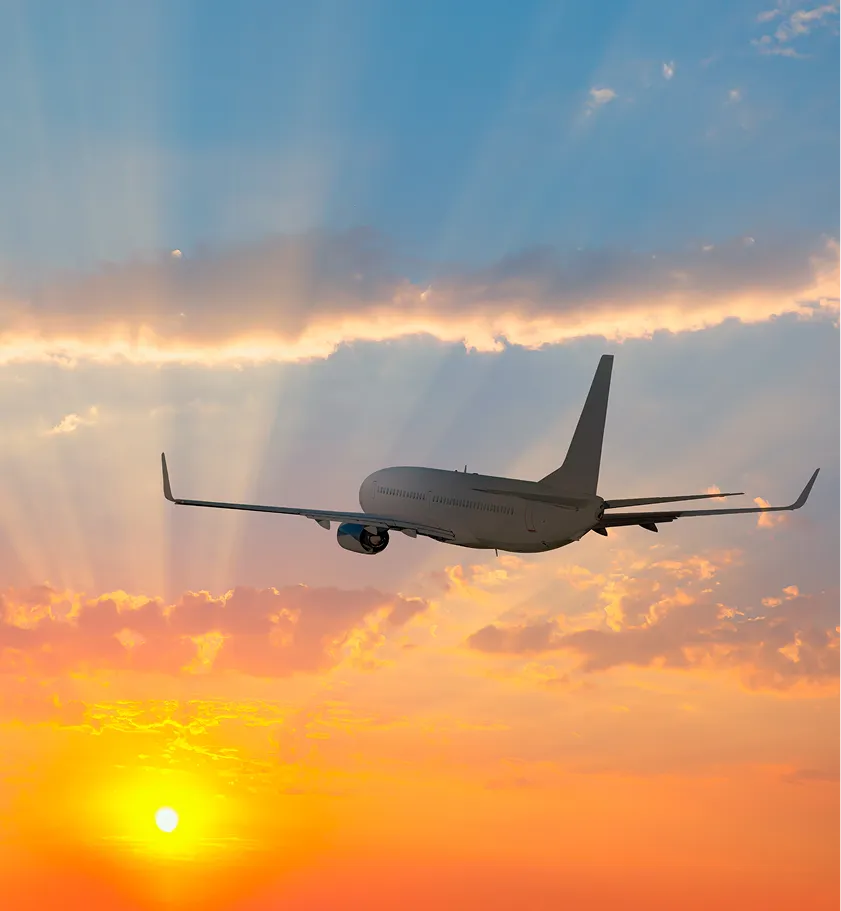Bucket List
MalawI
Malawi Magic Adventure
Three weeks in the “Warm Heart of Africa” from Dzalanyama Forest Reserve to Lake Malawi’s beaches.
Instructions
To make this component work with other components you must:
- Add a background color to the section div above ↑ this Timeline section. This is will help hide the progress line overflow.
- Add z-index-2 class to the section div above ↑ this Timeline section. This will ensure the oveflowing progress line from the Timeline section below ↓ is hidden underneath it.
.jpg)
Week 1–2
Into the Wild – Dzalanyama Forest Reserve
Welcome to Malawi – “The Warm Heart of Africa.” Your journey begins in the charming capital of Lilongwe, where you'll be greeted and whisked away to the enchanting Dzalanyama Forest Reserve, a haven of biodiversity, miombo woodlands, and sparkling mountain streams.
Here, the world slows down. You’ll reconnect with nature, with community, and with yourself.
Immersive Conservation & Community Action
Trail Blazer: Trek the forest with a purpose - help clear paths and prevent erosion to protect this fragile ecosystem.Plant the Future: Get your hands dirty in the seedling nursery and plant indigenous trees as part of sustainable reforestation efforts.Feathered Friends: Learn bird monitoring techniques in one of Malawi’s top birding hotspots - spot elusive species like the miombo pied barbet and the olive-headed weaver.Eco-Warrior Work: Support sustainable woodlot development to combat deforestation.School Spirit: Join local efforts in uplifting rural schools - paint classrooms, refurbish facilities, and inspire young learners.Women & Youth Empowerment: Work alongside local women’s groups and youth clubs to co-create projects that foster self-reliance and opportunity.Hands-On Skills: Master eco-brick construction, dive into permaculture gardening, and explore the art of honey harvesting.Wilderness First Aid: Advance your first aid knowledge in a practical and empowering setting.
Adventure & Awe
Forest Hikes to hidden waterfalls and ancient granite outcropsSnake Handling Sessions (under expert supervision!) for the brave-heartedEvenings by the Fire: Share stories, laughter, and local legends beneath the starsSunrise Bird watching: Wake with the forest and discover its most secretive inhabitantsLet the forest challenge you. Let the people inspire you. Let yourself evolve.
Week 3
Lake Life – Lake Malawi Escape
After two weeks of meaning and movement, it’s time to exhale. You’ll journey to the jewel of Malawi - Lake Malawi, where clear turquoise waters meet golden sands and island horizons. It’s the perfect backdrop to reflect, rejoice, and reset.
Aquatic Adventures
Snorkel with Cichlids: Float through a rainbow of fish in the world’s most biologically diverse lake
Kayak & Explore: Paddle to secluded coves, granite boulders, and island hideaways
Fishing at Dawn: Head out with local fishermen for a serene sunrise on the water
Jet Ski & Scuba: For thrill-seekers, dive deeper - no experience needed!
Relax & Reflect
Hammocks + Happy Hours: Sink into swaying shade and ice-cold drinksYoga with a View: Re-balance body and mind on a platform above the wavesBeachside Massages: Let local therapists ease your muscles after two weeks of hands-on workCreative Reflection: Join group storytelling or spend quiet time writing a diary about your transformation
Final Night Celebration
Bonfire on the Beach: Dance to local drumming under a star-filled sky
Farewell Feast: Enjoy a sumptuous dinner, laughter-filled toasts, and the bonds of new friendship


Departure
Homeward Bound, Heart Full
With the sun on your skin, forest soil on your boots, and Malawi in your soul, you’ll return home recharged, inspired, and transformed.
You’ll leave with a deeper sense of purpose - and perhaps, the start of your next great chapter.
Ready to Start Your adventure?
Enquire NowWhat Makes This Experience Wildly Unforgettable?
👉 Regular wildlife encounters with Africa’s iconic animals
👉 Real-life conservation, leadership & survival skills
👉 Deep cultural immersion and community connection
👉 Raw, unplugged African bush adventure
Find answers to all your burning questions, here.
Which medicines should I bring or have on hand?
Check with your local GP which immunisations you may need to have, or update, for both Zimbabwe and Malawi. e.g. Yellow fever, typhoid, hepatitis A, rabies, and others. Anti-malarial medications are essential - malaria is present across Zimbabwe and Malawi. Bilharzia (schistosomiasis) is a risk near freshwater (lakes, rivers). Recommended medications should be taken as prescribed before and after freshwater exposure. All providers emphasise the importance of comprehensive travel health insurance and carrying a well-stocked first-aid kit.
Which airlines fly from the UK?
To Zimbabwe: Common routes via Emirates (via Dubai), Qatar Airways (via Doha), Ethiopian Airlines (via Addis Ababa) and Kenya Airways (via Nairobi). Connections sometimes go through Johannesburg. From Malawi: Airlines servicing Blantyre or Lilongwe include Kenya Airways, Ethiopian Airlines, KLM and United (via Europe/Africa hubs).
Are there health concerns I should be aware of?
Yes, travellers should be aware of: Malaria risk in many parts of the country—anti-malarial medication is recommended. Yellow fever vaccination is required if you're arriving from a yellow fever zone. Always drink bottled or purified water.
Can I drink the tap water?
It is recommended to drink bottled or filtered water in Zimbabwe.
Are there COVID-19 or travel restrictions?
Regulations change often. Check with your airline and the official Zimbabwean government or health department websites for current travel and health guidelines.
Can I use my mobile phone in Zimbabwe?
Yes, with an international roaming plan, but it can be expensive. Buying a local SIM card (e.g., from Econet or NetOne) is a more affordable option for data and calls.
What should I pack for a trip to Zimbabwe?
Essentials include: Lightweight, neutral-coloured clothing Warm layers for cool mornings and evenings Sun protection (hat, sunscreen) Insect repellent Comfortable walking shoes Binoculars for wildlife viewing
Can I use credit or debit cards in Zimbabwe?
Card acceptance is limited, especially outside cities. Always carry enough cash, especially for smaller establishments or remote areas.
Do I need a visa to enter Zimbabwe?
Yes, most travellers require a visa to enter Zimbabwe. Visas can be obtained at the airport, border post, or online through the eVisa system. Requirements vary depending on your nationality, so check with the Zimbabwean embassy or immigration website beforehand. Travel Documents: Passports should be valid for at least six months from your arrival date
What is the best time to visit Zimbabwe?
The best time to visit is during the dry season, from April to September, especially for wildlife viewing and visiting Victoria Falls when the water levels are moderate and visibility is best.
What currency is used in Zimbabwe?
Zimbabwe uses a multi-currency system. The most commonly accepted currencies are US Dollars (USD) and South African Rand (ZAR). It's advisable to carry small denominations of USD in cash.
Is tipping customary in Zimbabwe?
Yes. Tipping is appreciated but not mandatory. A general guideline is: 10% in restaurants $5–$10 per day for guides $1–$2 per bag for porters
Is there anything else I should know?
Malawi is a friendly, welcoming country. Patience is helpful—things may move at “Africa time.” Take time to engage with locals and enjoy the slow, warm pace of life.
How can I support local communities responsibly?
Buy local crafts and produce. (Do not purchase any wooden made items that may be prohibited on flying out of the country). Support community-led tourism initiatives. Avoid giving sweets or money directly to children; support schools or community projects instead.
What cultural etiquette should I know?
Modest clothing is appreciated, especially in rural areas. Greetings are important; a handshake is customary. Always ask permission before taking photos of people.
Is Lake Malawi safe for swimming?
Yes, but take precautions: Be aware of bilharzia (schistosomiasis) risk—avoid swimming near stagnant or weedy areas, and consider testing/treatment if you swim extensively. Always check local safety and current advice.
Can I drink the tap water?
It is recommended to drink bottled or filtered water in Malawi.
What should I pack for my trip?
Lightweight, breathable clothing for warm days. A light sweater for cool evenings. Good walking shoes, a hat, sunscreen, and insect repellent. A reusable water bottle. A rain jacket if travelling in the rainy season.
What language is spoken in Malawi?
English is the official language, widely spoken in cities and tourism sectors. Chichewa is the national language, and locals appreciate learning greetings like: Moni! (Hello) Zikomo! (Thank you)
Is it easy to get a SIM card / internet access?
Yes, SIM cards are easily available (TNM, Airtel). Data packages are affordable, but coverage can be patchy in remote areas.
What currency is used, and can I use cards?
The Malawi Kwacha (MWK) is the local currency. US Dollars are sometimes accepted for tours/accommodation. Credit cards are accepted in some lodges and hotels, but cash is essential in many areas.
Is Malawi safe for travellers?
Malawi is known as the “Warm Heart of Africa” and is generally safe. Exercise standard travel caution: Keep valuables secure. Avoid walking alone at night in cities. Respect local customs.
What vaccinations do I need?
Yellow Fever: Required if coming from a Yellow Fever zone. Recommended: Hepatitis A & B, Typhoid, Tetanus. Malaria: Malawi is a malaria zone, so anti-malarial medication and mosquito precautions are essential. For taking part in any lake based activities, we suggest purchasing bilharzia medication.
Do I need a visa to visit Malawi?
Most visitors do not need a visa. Check the Malawi Immigration website before travel. Travel Documents: Passports should be valid for at least six months from your arrival date.
What Makes This Experience Wildly Unforgettable?
Regular wildlife encounters with Africa’s iconic animals Real-life conservation, leadership & survival skills Deep cultural immersion and community connection Raw, unplugged African bush adventure
Why Choose This Adventure?
This is not a tour – it’s a full-blown African experience. You’ll gain: Lifelong friendships Hard skills in conservation, community work, and survival Soft skills in leadership, communication & resilience A real sense of purpose and contribution
How long is the programme?
The standard youth programme is eight weeks long. A typical eight week programme includes: 1-2 weeks orientation, 5-6 weeks of project work, then 1-2 weeks down tim
Is a pre-departure briefing offered?
Yes, we will have individual conversations with each person - covering practical travel safety, medical kit essentials, cultural awareness, and risk management. In-country orientation: At the start of programmes, expect briefings on local culture, language (basic Shona in Zimbabwe and Chichewa in Malawi), project details, and Health & Safety protocols.
Any Questions?
.webp)
